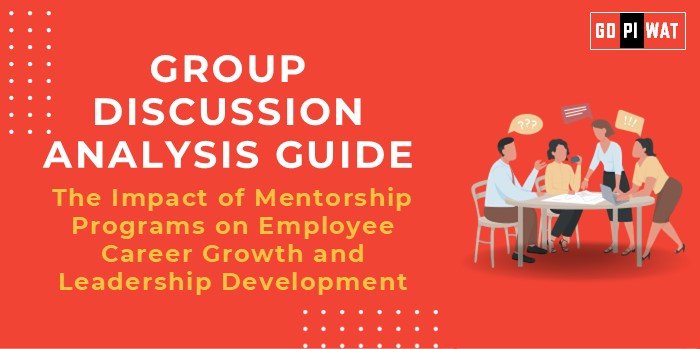📋 Group Discussion Analysis Guide: The Impact of Mentorship Programs on Employee Career Growth and Leadership Development
🌐 Introduction to Mentorship Programs in Career and Leadership Development
Opening Context: “In today’s competitive corporate landscape, mentorship programs are emerging as strategic tools for fostering talent, enhancing career growth, and preparing future leaders.”
Topic Background: Mentorship has long been recognized as a critical element of professional development. Modern organizations, especially large corporations, have adopted structured mentorship programs to bridge skill gaps, boost employee morale, and ensure leadership succession.
📊 Quick Facts and Key Statistics
📈 Employees with mentors are 5x more likely to be promoted than those without mentors (Source: Gartner).
🌍 Retention rates increase by 72% in companies with mentorship programs (Source: Deloitte).
🏆 Leadership pipeline enhancement is a top priority for 75% of organizations globally.
👩💻 Millennials and Gen Z employees cite mentorship as a critical factor in job satisfaction and long-term career goals.
🤝 Stakeholders and Their Roles
- 👨💼 Employees: Beneficiaries seeking career direction, skill enhancement, and growth opportunities.
- 👩💼 Senior Leadership: Mentors providing knowledge, experience, and leadership insights.
- 🏢 Organizations: Facilitators of structured programs aimed at employee development and retention.
- 📋 Human Resource Departments: Coordinators managing mentorship structures, pairing, and outcomes.
🏆 Achievements and Challenges
✨ Achievements:
- ✔️ Career Progression: Mentorship increases promotions, with 20% faster salary growth among mentees.
- ✔️ Diverse Leadership: Companies with mentorship programs see a 30% rise in women and minority leaders.
- ✔️ Improved Engagement: Mentees are more engaged and productive, leading to a 25% boost in job satisfaction.
- ✔️ Knowledge Transfer: Mentors pass on institutional knowledge, preserving expertise in organizations.
⚠️ Challenges:
- ❓ Lack of Structured Programs: Many mentorship programs fail due to poor planning and misalignment of goals.
- ❓ Mentor Availability: Senior leaders often lack time for consistent mentorship.
- ❓ Bias in Mentor Selection: Ineffective matching leads to subpar results.
🌍 Global Comparisons:
- 💼 Google: Provides global mentorship programs, fostering leadership in high-potential employees.
- 💡 General Electric (GE): Implements rotation-based mentorship for leadership pipeline creation.
📚 Case Study:
- 🎯 IBM’s Global Mentorship Program: Increased career progression among mentees by 48% and reduced attrition rates by 20% through a structured digital platform.
🗣️ Structured Arguments for Discussion
Supporting Stance: “Mentorship programs significantly accelerate leadership readiness, bridging gaps between skill sets and industry needs.”
Opposing Stance: “Mentorship programs often fail without proper implementation, leading to resource drain and unmet expectations.”
Balanced Perspective: “While mentorship programs foster leadership and growth, their success depends on structured frameworks, efficient matching, and accountability.”
💡 Effective Discussion Approaches
- 📜 Opening Approaches:
- “Studies show employees with mentors are 5x more likely to achieve career growth milestones.”
- “IBM’s mentorship initiative showcases a direct link between mentorship and retention improvement.”
- 🛠️ Counter-Argument Handling:
- “Though some mentorship programs lack structure, companies like Google demonstrate that systematic approaches yield transformative results.”
📈 Strategic Analysis of Strengths and Weaknesses
- 🏅 Strengths: Knowledge transfer, leadership readiness, and retention improvement.
- ⚠️ Weaknesses: Mentor-mentee mismatch issues and limited scalability in large firms.
- 💡 Opportunities: Integration of AI-powered mentorship platforms and cross-industry knowledge exchange programs.
- ⚡ Threats: Time constraints of senior mentors and poor evaluation mechanisms.
🎓 Connecting with B-School Applications
- 📚 Real-World Applications: Analyze mentorship’s role in HR strategies, leadership development frameworks, and talent retention projects.
- 💬 Sample Interview Questions:
- “How can mentorship programs influence leadership development in organizations?”
- “What challenges do mentorship initiatives face, and how can they be addressed?”
- 🔑 Insights for B-School Students: Mentorship is critical in understanding real-world leadership development models and as a research focus for HR and organizational behavior.


